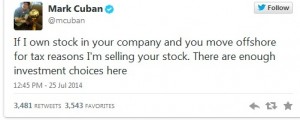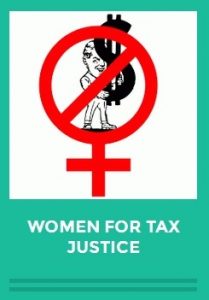 Maverick puts corporate inversions in the firing line
Maverick puts corporate inversions in the firing line
Mark Cuban, the billionaire American investor and owner of the Dallas Mavericks, took to Twitter last week to say he would be dumping shares in any company that moves offshore for tax purposes.
This came just a day after President Obama also attacked corporate inversions, where companies can move their tax base to a tax haven if they buy a company based in that jurisdiction. In an interview with CSNBC, the president said that companies which continued to benefit from the country’s infrastructure while moving their tax base offshore were being unpatriotic.
Inversions are becoming a bigger and bigger problem for the United States. Goldman Sachs released a chart showing that there is potentially $15bn of revenue moving offshore this year.
Hmmmmmm Danone
Hospira, a US based medical products company is in talks to buy the medical nutrition arm of Danone, the French food company. The move has sparked concern in the press that this will allow Hospira to undergo a tax-based corporate inversion.
The FT reports that if the deal goes ahead it will allow Hospira to move its tax base to France. But wait! Arrête! France? Isn’t that the kingdom of socialism? Why would potential tax avoiders look there for a new home base?
Here at Wrapper Towers we did a little digging on Danone. According to their latest annual report (called a “registration document” in France) the medical nutrition segment of the company is held under the brand ‘Nutricia’. Nutricia in the UK is held by a series of companies ending with Nutricia International BV, a subsidiary of Danone registered in the Netherlands, a well known tax haven. QED, probably.
Hometown disapproval for tax inversion
Perhaps the most interesting critique of corporate inversions has come from James Burke, the Mayor of Dixon, Illinois, who penned a column a column in USA Today entitled Walgreens: Don’t Dodge Taxes.
Illinois clearly has a thing about inversions. Hospira is based in Illinois, President Obama was formerly Senator for Illinois, and Walgreens the huge supermarket chain based in Illinois is also considering buying Alliance-Boots based in Switzerland, in a move that could cost taxpayers $4bn over the next five years. Alliance-Boots has its own history of course, it moved from the UK to Switzerland, costing the UK Treasury up to a billion pounds in the process.
As the Mayor notes, Dixon, Illinois, is where the founder of Walgreens, Charles Walgreen Sr., was raised before he took over a drugstore in Chicago and started the chain that today has revenues of $72bn. Walgreen became a major benefactor of the town, building public amenities and saving the local bank during the depression. He would never have approved of, or even contemplated the deal (and it might be useful to speculate on whether his former golf caddy would have approved the deal).
As Burke says, “good business gives back”.
 Women for Tax Justice
Women for Tax Justice
A warm welcome to one of the newest campaigning organisations in the global tax justice movement, Women for Tax Justice. Women for Tax Justice looks at Tax Justice from a feminist perspective. Women are more likely to live in poverty, and are more likely to feel the impacts of cuts in government spending.
Check out their new website here.
The World Bank needs a lesson in democracy
Last week’s Wrapper reported on the dispute between Tullow Oil and the Ugandan tax authority. Tullow had a sweetheart tax deal with the Ugandan government thrown out; a court in Uganda held that because the Ugandan Minister of Energy (who signed the contract) had no authority to grant a tax concession, the contract was void.
Tullow are expected to appeal the decision and may eventually end up in the International Centre for The Settlement of Investment Disputes (ICSID), based at the World Bank in Washington DC.
According to the Ugandan Observer newspaper there have been 13 similar cases of governments seeking to quash tax deals that had been made without legal authority. Mysteriously, all of these attempts have been overturned at the ICSID.
But who are the ICSID? And why do they seem so keen in enforcing contracts which so plainly act against the interests of sustainable economic development and which have been held to have been made outside the law. The Wrapper will be looking into this over the next few weeks. Do get in touch if you have any information you would like to share.
Hat tip to @jeff_mbanga
Cayman’s man in Westminster
Back in March The Independent newspaper revealed that a member of the British House of Lords had entered into a contract to, amongst other things, lobby members of Parliament on behalf of the Cayman Islands Government.
At the time Lord Blencathra defended himself by saying that although he was being paid by £12,000 a month by the Cayman Islands government, he had never intended to do the lobbying part of his contract.
Now the Lord has been forced to apologise to Parliament for his conduct. The full text of the apology is below, with added commentary from The Wrapper.
“Although I never actually provided nor intended to provide parliamentary services to the Cayman Islands Government in return for payment, I acknowledge and deeply regret that I entered into a written contract under which I was apparently committed to provide such services (as one of 14 specified “consultancy services”). [In other words, I signed a contract to provide services in the knowledge I wouldn’t do them – eds]
I now recognize and accept [after spending a long time in denial – eds] that such a contract was in clear breach of the requirement in paragraph 8(b) of the Code of Conduct that members “must not seek to profit from membership of the House by accepting or agreeing to accept payment or other incentive or reward in return for providing parliamentary advice or services.”
I misled myself into thinking that, since it was understood that I would not be making representations in reality, then the wording did not matter. But words do matter; [DOH! – eds] I was wrong and I apologise to the House for that misjudgement.
When the contract was renewed in November 2012 the reference to providing such services was deleted [after the Independent has first accused me of working for the Cayman Islands Government to lobby Parliament – eds] and in March 2014 the contract ended.
I deeply regret having breached the Code in this way and the embarrassment to the House that I recognise is caused by such conduct. I offer the House my sincere apology.”
[I was caught red handed – eds]
Botswana under the microscope for weak money laundering safeguards
The US Government has criticized Botswana for failing to report how many transactions at local banks had been treated as suspicious, as it has done in previous years. This means progress on how the country is implementing anti money laundering standards is more difficult to monitor.
A report in Botswana’s Sunday Standard highlights a number of failures in the country’s anti money laundering regime. For example, although Parliament in Botswana set up a Financial Intelligence Agency in 2009, by 2013 the agency only had 4 staff and was unable to analyse suspicious financial transactions.
There are also no controls relating to politically exposed persons, which is probably one reason why government officials have been able to smuggle millions out of the country.
TJN has also being keeping an eye on Botswana, which scored an unimpressive 73 points on our 2013 Financial Secrecy Index. As we reported last November, Botswana currently has 13 Double Taxation Agreements with countries including India, Mauritius, the Seychelles and the United Kingdom. A further twelve DTAs are under negotiation, including with Belgium and Luxembourg. This is clearly a country to watch.
Tax revenues up in smoke?
The British Telegraph this week has a story highlighting that one in five cigarettes smoked in the UK have avoided excise duty. This is because people are bringing home foreign cigarettes, or buying black market cigarettes.
The story is an interesting case study in how corporates can seek to hijack the tax justice agenda for their own benefits. The news story in the Telegraph is based on a report from the tobacco industry. The solution proposed? Cut taxes on cigarettes. Quelle surprise.








Leave a Reply